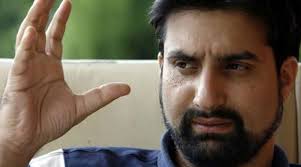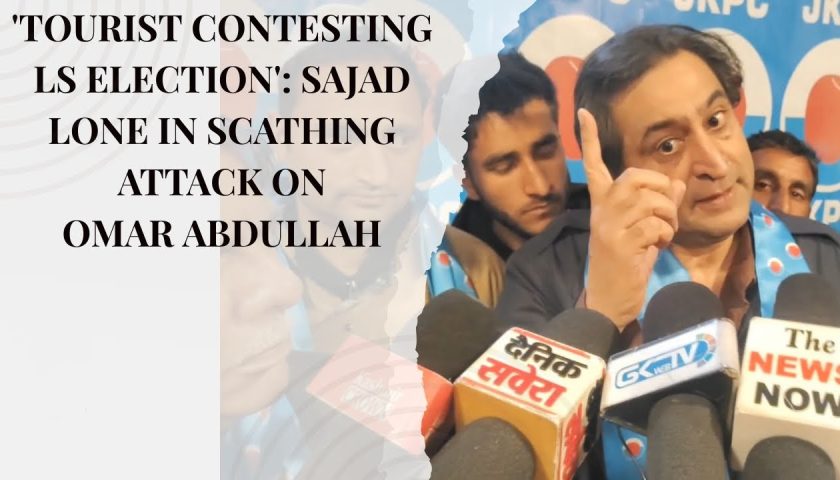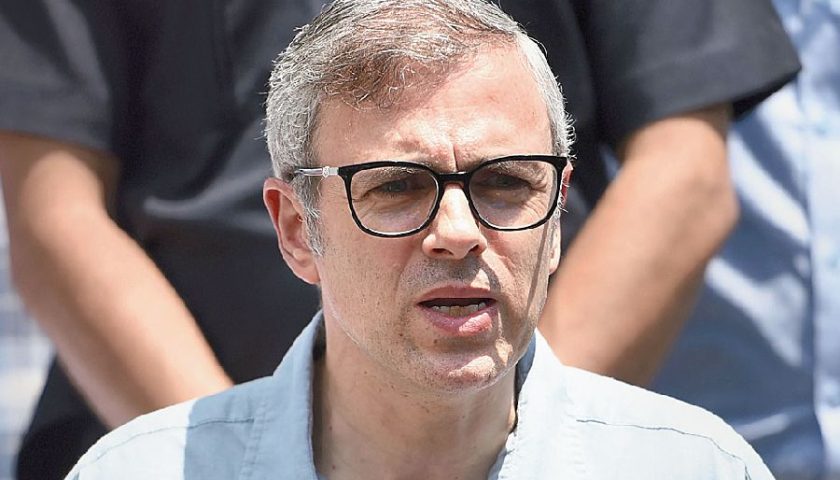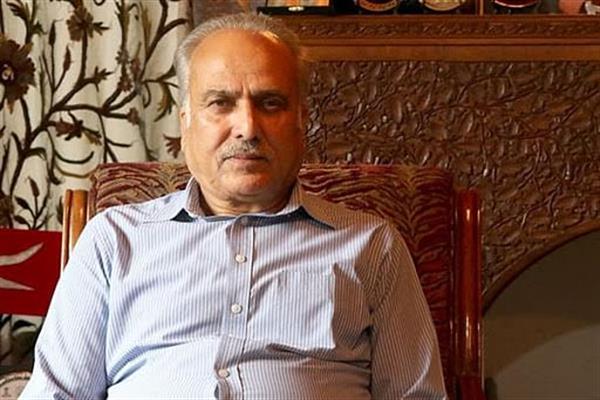Even as the unrest in Kashmir continues, the Hurriyat Conference is facing challenges from two sides. On one side the National Investigation Agency is probing Hurriyat leaders for alleged money laundering. On the other side, renegade Hizbul Mujahideen commander and presently the head of an Al Qaeda affiliate, Zakir Musa, is presenting the struggle in Kashmir as a religious war. Mirwaiz Umar Farooq discusses these challenges as well as the ongoing unrest in Kashmir, in a conversation.
Q. Are you happy with the new state of affairs in Kashmir and the direction that Kashmir is taking?
A. No, we are not happy to see that even our new generation is getting consumed by militancy. When these boys join militancy and die, we feel very sad. It is true that we have to take the movement forward but we don’t want to only pay tributes to our young martyrs. But at the same time we have little option. India is out to crush the movement by whatever means possible.
Unfortunately, only support we had in India in the form of the political opposition and civil society doesn’t seem to exist now. Their discourse has vanished from the scene. The direction that Indian media, particularly the electronic media has taken, is that every Kashmiri has become an enemy. The moment you talk about Kashmir and if you don’t agree with their discourse, you are a traitor.
Q. You appear to be sore about the new discourse on Kashmir that is shaping up in India?
A. See how the discourse has shifted. First we were anti-national, then separatist and now we are traitors. There is no distinction, no nuance left. Besides, the discourse that has been created is that everything is Pakistan-driven, money-driven and sponsored. They want to hit the indigenous character of the Kashmir movement. Nobody questions this discourse on the grounds that nobody will die or get blinded for Rs 500.
Q. How do you look at the NIA raids on separatist leaders?
A. No doubt this is a difficult time for us. There is an all-out onslaught on us. In 2016, there was unrest for six months. They arrested Hurriyat leaders but it didn’t change anything. They thought arresting us is like giving us respect, raising our reputation among people. So they came up with this idea to tarnish our reputation. They still arrested us but this time the charges were different. They said we were involved in money-laundering, corruption and building property. This is to hit our credibility. But people are smart enough to see what is happening around.
Q. Local youth are once again joining militancy in large numbers…
A. See our biggest concern is how to save our youth, our new generation. We want the focus should shift towards the political, non-violent aspect of the movement. But New Delhi doesn’t give us space.
Q. If you are given the space, will you work towards a peaceful, political struggle free of militancy?
A. I think that this will be our effort. In fact, before the BJP came on the scene, we had already been transitioning towards a non-violent resistance. It began with the 2008 agitation when people realised that a non-violent struggle had a stronger impact than a violent one. Even for that matter, last year’s protests. Even though the unrest began with the killing of Burhan Wani, the resistance was non-violent. But the sense one gets is that New Delhi feels more comfortable dealing with a violent rather than a non-violent struggle. We in Kashmir need to get focus back on the fact that Kashmir is a peaceful, political struggle rather than a violent one.
Q. How do you look at the emergence of Zakir Musa as the chief of an Al Qaeda affiliate in Kashmir?
A. Yes, we have been watching the emergence of Zakir Musa and the attendant ideology that the fight in Kashmir is for Islam. No doubt, our mosques, shrines, prayer grounds, Imambaras have been centres of resistance. Our template slogan is Allahu Akbar (God is Great). But that doesn’t mean Kashmir is an Islamic problem. Or for that matter a Hindu India versus Muslim Kashmir problem. No doubt, there is a section of youth that thinks that ours is a struggle against kufr, but we don’t want to go in that direction. We are clear in that. That is the reason why (Syed Ali Shah) Geelani Sahib, Yasin (Malik) Sahib and I have stated clearly and categorically that we don’t subscribe to this thought.
Yes, Islam inspires you to fight against injustice. It urges you to fight for your rights. But this problem primarily has a background. It has a history. It has a baggage. We can’t say now this is Hindu India versus Muslim Kashmir. No, that is not a fact. This is a discourse that only helps India.
Q. So what would you say to Musa and his associates?
A. Our appeal to these boys is – Don’t do this. They need to be reminded that the backdrop of the militancy has to do with the political dispute. The fact that Salahuddin became a militant after being thwarted in his political struggle is a well known fact. When Hizbul Mujahideen and JKLF were formed, their domain was Kashmir. They didn’t and don’t have a global agenda.
I think the only thing that shouldn’t have happened and which we condemn is that Hizbul Mujahideen shouldn’t have owned up to the Pathankot attack. The fact is they were not involved in the attack. I don’t know why and for what reason they accepted the responsibility for the attack. They should not have done this.
If we are justifying the militancy in Kashmir, we are doing so in the context of Kashmir dispute. And we reason that the youth were forced to take up gun because of the occupation and oppression. And there is the story of Burhan, how he was forced to become a militant because of his experience. Or the boy from Nowhatta, Srinagar who was recently killed. We know his history and background; (and) how he too was forced to take up arms.
Q. How could you help the situation at your level?
A. See, this is a worrisome situation for us. We have boys throwing stones now ready to pick up guns. They think there is no other option. This is a challenge for us. We feel these boys should get engaged in a political battle, in a battle of ideas. But what can we do? We have been confined to our homes. We are not allowed to move out.
We know our boys have the sentiment for freedom. We could engage them politically. We could start a youth campaign. We could start a debate and discussion.
If people from outside can come and have a debate in Kashmir University why can’t students themselves be allowed to have such a debate? Give us a space for dialogue. Let them create a Jantar Mantar in Kashmir. We would ourselves help in the creation of this space.
But in the absence of such a space, all we are left to do is to call for a hartal when something happens. We know nothing happens to India due to our hartals. For us hartal has now become less of a protest and more of a mourning. We mourn the loss of our youth. All other means of protest have been denied to us.
Q. Do you think Zakir Musa occupies a credible ideological space in Valley?
A. The sentiment is authentic. To be honest, I can’t say it is entirely state-driven. Yes, the state would support it as it suits it’s interests. They would like to push the discourse towards Al Qaeda, ISIS and Taliban. I won’t, however, say Musa’s is a predominant discourse but at a certain level it is a discourse. A section of youth is asking questions that if they are leaving their homes to die, why they are doing it. Now what is to be seen is whether this thought process assumes dominance or the indigenous character of the movement holds its ground. On our part, we want to preserve the indigenous character of the movement.
Q. Are you worried about the direction the militancy is taking?
A. Yes, this is a cause of worry. Leave the movement aside, in Kashmir we had certain norms. We had certain traditions and values. Those are weakening by the day. We see the state also responsible. State has added to it. Over the past ten-twenty years we have witnessed fragmentation of our social fabric. We now have Barelvis, Ahle-Hadith and Deobandis. This was not the dominant discourse here. The State is encouraging it. The attempt is to Indianise the strain of Islam. There is no doubt that many religious schools are being funded by agencies and the home ministry. Money is given to Imams. They are asked not to talk about politics and remain confined to religion only.
Parts of South Kashmir abound in sects. But last year there was a big setback for them in South Kashmir. Different ideological and sectarian groups united against oppression. They came together on one platform. Now they are again trying to win them over again.




